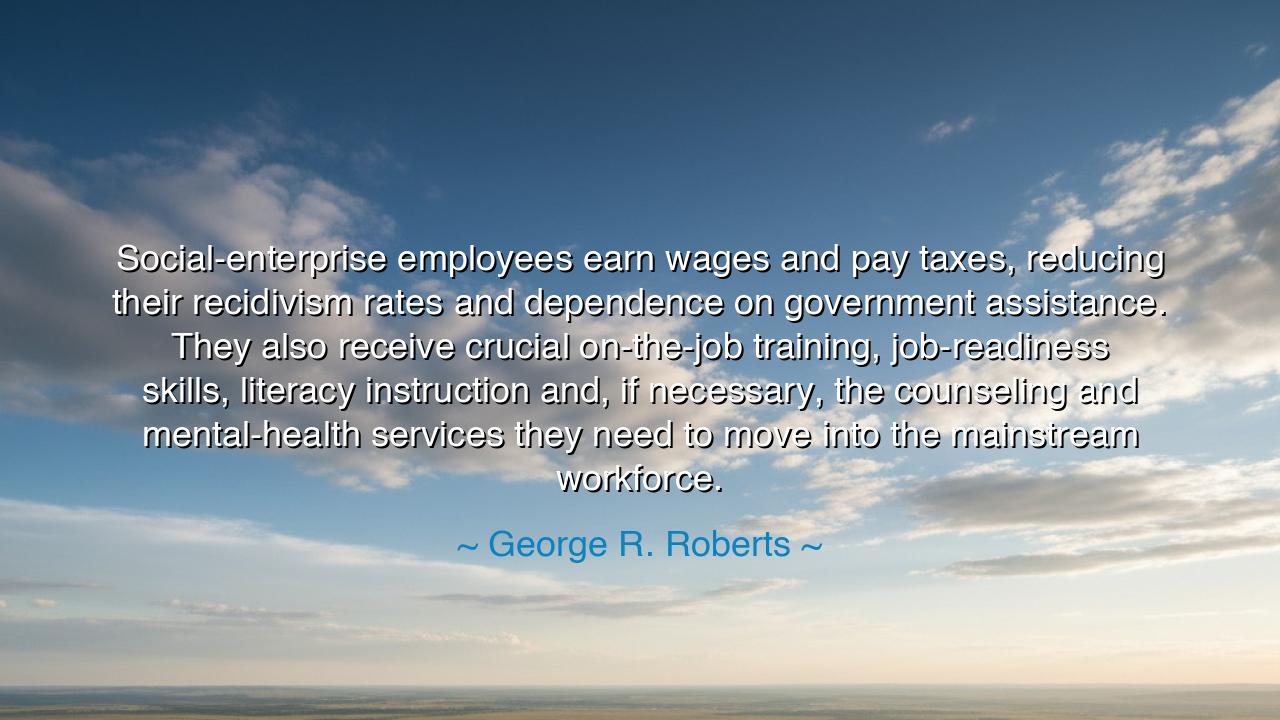
Social-enterprise employees earn wages and pay taxes, reducing
Social-enterprise employees earn wages and pay taxes, reducing their recidivism rates and dependence on government assistance. They also receive crucial on-the-job training, job-readiness skills, literacy instruction and, if necessary, the counseling and mental-health services they need to move into the mainstream workforce.





Hearken, children of compassion and wisdom, and attend to the words of George R. Roberts, who spoke with clarity and foresight: "Social-enterprise employees earn wages and pay taxes, reducing their recidivism rates and dependence on government assistance. They also receive crucial on-the-job training, job-readiness skills, literacy instruction and, if necessary, the counseling and mental-health services they need to move into the mainstream workforce." In these words lies a profound reflection on restoration, opportunity, and the transformative power of work. Roberts reminds us that labor, skill, and guidance are not mere tools for survival—they are instruments of redemption and empowerment.
The origin of Roberts’ insight rests in the evolution of social enterprises, where work is designed not solely for profit, but for social impact. By engaging individuals often marginalized or previously incarcerated, these enterprises provide wages, skills, and dignity, bridging the divide between exclusion and integration. Through employment, individuals are not only earning a living, but contributing to society, paying taxes, and reclaiming agency over their own lives. Here, Roberts illuminates a timeless principle: responsibility fosters transformation, and engagement fosters belonging.
Consider the imagery of training and counseling. A social-enterprise worker does not merely perform tasks; they cultivate literacy, practical skills, and the resilience to navigate a complex society. This mirrors the ancient practice of apprenticeships, where young men and women learned trades, ethics, and social conduct under the guidance of masters. Just as the apprentice gained mastery and moral grounding, so too do participants in social enterprises acquire tools that empower them to re-enter the broader workforce with competence and confidence.
History provides vivid exemplars of such transformative labor. In the early 19th century, Ebenezer Scrooge-inspired industrial reformers in England created programs to educate and employ the poor, reducing crime and dependency, and instilling dignity and purpose. Similarly, modern initiatives—like rehabilitation programs linked with employment—demonstrate that structured labor, mentorship, and guidance can reduce recidivism, foster stability, and restore individuals to society as productive, contributing citizens.
Roberts’ words also illuminate the broader societal benefit of such programs. By reducing dependence on government assistance and lowering rates of recidivism, social enterprises enhance communal stability, economic growth, and civic engagement. Each participant who gains employment, skills, and self-confidence becomes a living testament to the power of guided opportunity and human potential, transforming not only their own life, but the wider society.
The lesson is timeless: human potential is unlocked not merely by compassion, but by structured opportunity, guidance, and the dignity of work. To restore someone to society requires more than charity; it requires training, counseling, literacy, and practical experience, all aimed at equipping the individual to thrive independently. Roberts reminds us that empowerment is a process, one that aligns personal growth with societal contribution.
Practical actions emerge naturally: support programs that provide employment and training to marginalized populations; advocate for comprehensive social enterprises that include counseling, literacy, and job-readiness instruction; engage in mentorship and community-building initiatives; and recognize the intrinsic value of labor as a force for transformation. By doing so, one helps create a society where every individual has the opportunity to contribute, thrive, and reclaim dignity.
In sum, Roberts’ wisdom teaches that work, training, and support are not mere economic tools—they are instruments of moral and social restoration. Social enterprises embody the ancient ideal that the laborer, guided, skilled, and supported, can rise from marginalization to full participation in the life of the community. Let this truth inspire both policy and personal action, so that society nurtures not only productivity, but the enduring human potential for renewal and contribution.
If you wish, I can craft an even more epic, mythic version, turning Roberts’ reflection into a heroic narrative of redemption, labor, and the transformative power of opportunity—ideal for immersive audio storytelling. Do you want me to do that?






AAdministratorAdministrator
Welcome, honored guests. Please leave a comment, we will respond soon